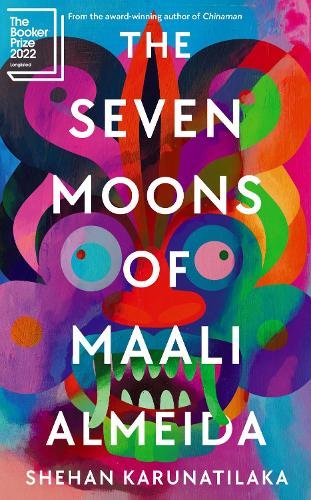I'm a sucker for a story involving a fabulous but sinister grandmother and “The Hungry Ghosts” has one who is absolutely fascinating to read about. Set in Sri Lanka during a time of civil war, the protagonist Shivan describes his early life when he and his impoverished mother and sister were forced to move in with his grandmother Daya Nona. This is an intimidating older woman who is kind of a cross between Ebenezer Scrooge and Miss Havisham. The story plays out a bit like a Dickensian tale as Shivan becomes the favoured grandson of this irascible and tightfisted lady who begins instructing him on how to manage her many rental properties. He appears to have good future prospects but as he becomes a teenager the political unrest in the country reaches a degree where it becomes unsafe for Shivan and his sister to remain living there. Though their mother is Sinhalese their deceased father was Tamil, an ethnic minority who were severely persecuted amidst the conflict. Added to this is Shivan growing awareness of his own homosexuality. Despite Daya Nona's objections, the trio move to Toronto where they experience difficulty establishing new lives as immigrants. The narrative relates the story of Shivan's life from a point where he's independently established a good job, apartment and relationship but he must make a crucial decision between his hard-won present day existence and the country he's left behind with all its painful memories.
I was glad to already have some understanding of the recent conflicts in Sri Lanka after reading novels such as “The Seven Moons of Maali Almeida” and “A Passage North” which encouraged me to research more about the deep-set political divisions in the country which led to much bloodshed. The complex and tragic situation has been fought for decades with periods of egregious discord and genocide. Though it mostly occurs in the background of Selvadurai's novel it influences and effects the lives of its characters to such a degree it's necessary to be aware of the stakes involved. The novel explains this somewhat and helped broaden my understanding even further. It's extremely effective how the larger conflicts within the country suddenly become very personal at a certain point in the story and how some individuals used the larger political strife for their own personal gain and advancement. This increases the characters' complexity as they find themselves caught between opportunity, loyalty and justice.
At the centre of this tale is Shivan's conflicted sense of being as he obtains certain freedom and safety in Canada, but longs for his homeland. At one point he remarks: “Rising in me was a great longing to be back in Sri Lanka and also, paradoxically, a revulsion against being there. These two irreconcilable feelings pressed tight against each other.” These feelings are very connected with his grandmother who is both his supporter and partly responsible for inhibiting his freedom. It's impressive how their relationship develops more and more layers as revelations are uncovered and events dramatically unfold. Equally, it's poignant how the novel shows that parts of the gay community in Canada which Shivan desperately wants to join is plagued by racism which makes him feel even more cruelly ostracised. Though it's moving how the story roots the reader so strongly in Shivan's first person point of view, the narrative wobbles somewhat as we switch in some sections to the mother and grandmother's perspectives. I'm not sure if we're meant to believe these are their actual thoughts/experiences or Shivan's projection of their points of view. While I understand the author wanted to give a balance to the story and delineate these figures' states of mind it confuses the novel somewhat.
Another aspect of the novel running alongside Shivan's personal account are Buddhist stories which his grandmother relates to him. These act as parables which comment upon the characters' actions and decisions. I enjoyed how this sense of storytelling becomes so infused with his sense of being. Of course, I felt very sympathetic to Shivan since he is naturally bookish and it's pleasurable how he drops in the names of many titles and authors he reads. Alongside the strength of his character, the evolving dynamics of his relationship to his mother and grandmother are very compelling. However, the tensions between Shivan and his longterm boyfriend feel more inscrutable. This becomes the most prominent aspect of the later part of the novel and makes the book less satisfying than if it had stuck more closely to Shivan's immediate family. Nevertheless, I greatly enjoyed this tale which evocatively brings to life two very different and distinct environments and a boy caught between them.










